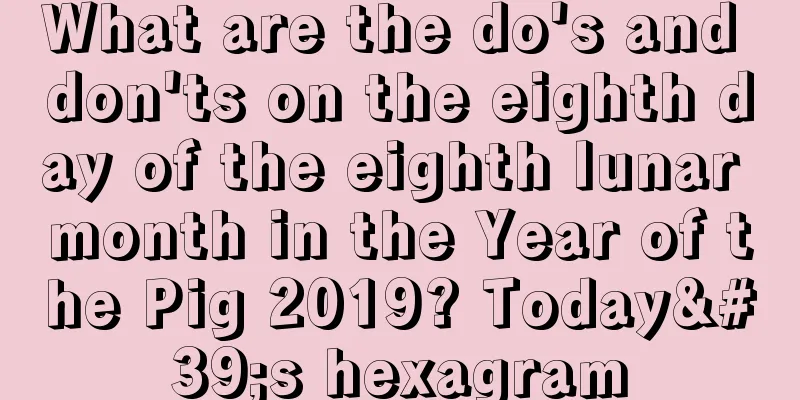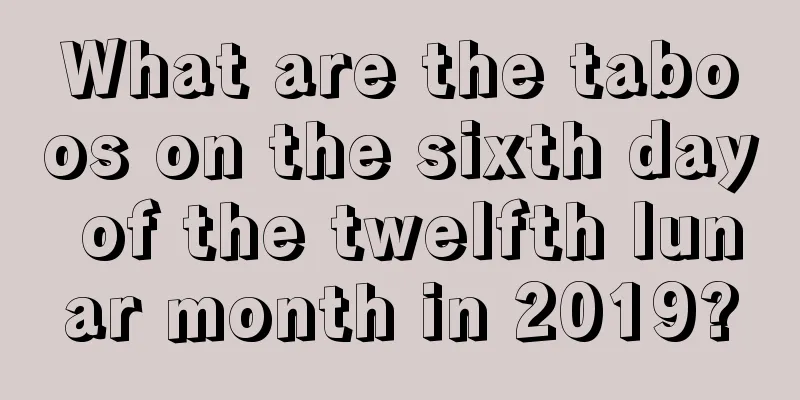Plants can also be divided into good and bad Feng Shui to analyze for you

|
Introduction: In Feng Shui, different plants are given different Feng Shui meanings and their functions are also different. Plants can also be divided into auspicious and inauspicious. Which plants are auspicious and which are inauspicious? Feng Shui will explain it to you. If you want to know more about Feng Shui, Mr. Shui Mo has prepared a special topic on Feng Shui for you to give you a more comprehensive understanding. 1. Plants Considered Auspicious1. Auspicious grass: Auspicious grass is small, green all year round, and grows easily in mud and water. It symbolizes "good luck" and is also called auspicious grass. 2. Orange: “Orange” is homophonic with “lucky”, which means luck. Therefore, potted citrus plants have become a home decoration during the Spring Festival. 3. Chinese toon: Chinese toon is easy to grow and long-lived. In some places, the custom of touching Chinese toon trees is popular. On New Year’s Eve, children would touch the toon tree and circle around it a few times, praying to grow taller quickly. In some places, on the morning of the first day of the first lunar month, children hug the toon tree and recite "Toon tree, Toon tree, you are the king, you grow thicker and I grow taller." 4. Gourd: In Feng Shui, gourd is considered to be a plant that can drive away evil spirits, and the ancients often planted it in front of and behind their houses. Modern physical tests have proved that the "treasure gourd" shaped vessel can shield interference from various waves and radiation. 5. Peach tree: It is said to be the essence of the five elements and can ward off evil spirits, so peach charms are hung on doors during the New Year. 6. Sophora tree: It is believed to represent "lu". In ancient times, the imperial court planted three locust trees and nine thorn trees. The dukes and officials sat under the trees. Those facing the three locust trees were called the Three Dukes. Later, locust trees were planted in courtyards. 7. Willow: It has the same function as the peach tree. Willow branches can be inserted at the door to ward off evil spirits. 2. Plants Considered to Be Bad Omens1. Feng Shui Trees: In the south, some villages still have a small area of lush forests nearby, most of which are evergreen trees such as camphor, pine, cypress, and nanmu. As a tourist, please don't touch them. Because this is a Feng Shui tree, also called a water mouth tree. Even though it is just a small piece of green forest, it is related to the Feng Shui lifeline of the entire village. Local people dare not touch any grass or tree there, for fear of destroying the Feng Shui of the village. 2. Eucalyptus: This "giant" tree can grow to more than twenty stories high like a building. Young and middle-aged people dare not plant it because it is said that if the tree grows too big, the person will die. To plant this tree, you have to ask an elderly person to do it. Even if the tree grows big, the planter will almost die. |
<<: Teach you some common methods to ward off evil spirits
>>: Want to buy a car? The complete guide to car feng shui helps you choose the right car
Recommend
Is the eighth day of the first lunar month in 2021 suitable for funerals?
Funeral is the last journey of life, so of course ...
Is October 1st a good date for Cold Clothes Festival 2021? Is this day suitable for picking up the car?
In October, Hibiscus shows a small yang, which is ...
Is the 25th day of the first lunar month in 2022 a good day? Is it an auspicious day for a funeral?
The first month of the lunar calendar is also know...
Analysis of the date of April 26th in the lunar calendar in 2021: Is it a good day to get engaged?
The pros and cons of getting engaged at different ...
What are the taboos on the 25th day of the eighth lunar month in 2018?
Autumn is the season of harvest. As the eighth mo...
Is the 23rd day of the second lunar month in 2019 a suitable day for building a grave? What are the Feng Shui considerations for building a grave?
Introduction: Repairing a grave is a very solemn m...
Is it okay to sign the contract on March 18th of the lunar calendar in 2022? Can we sign the contract?
I believe that no matter who it is, everyone hopes...
Is it a good day to start renovation on the 23rd day of the first lunar month in 2019?
If you don’t choose an auspicious day when startin...
What should we pay attention to in health preservation in the beginning of winter in 2018? Analysis of health preservation in the beginning of winter!
Introduction: There are many things to pay attenti...
What is the meaning of releasing lotus lanterns on the Chinese Valentine’s Day? Which festivals require the release of lotus lanterns?
As one of China's traditional festivals, Qixi ...
How is the 25th day of the seventh lunar month in 2020? What is suitable to do?
Days can be auspicious or inauspicious, so is the ...
Is October 24, 2019 a good day to pick up a car?
Picking up a car, like building a house and decor...
What will the lunar May 30th be like in 2022? Is it suitable for a haircut?
What will the lunar May 30th be like in 2022? Is i...
What is the lunar calendar for the Ghost Festival on July 14, 2022? Can I get a haircut on this day?
The seventh month in the lunar calendar is the fir...
Is it good for people born on the beginning of winter in 2020? What should be supplemented in the five elements and eight characters?
In the cold season of winter, all things choose to...









